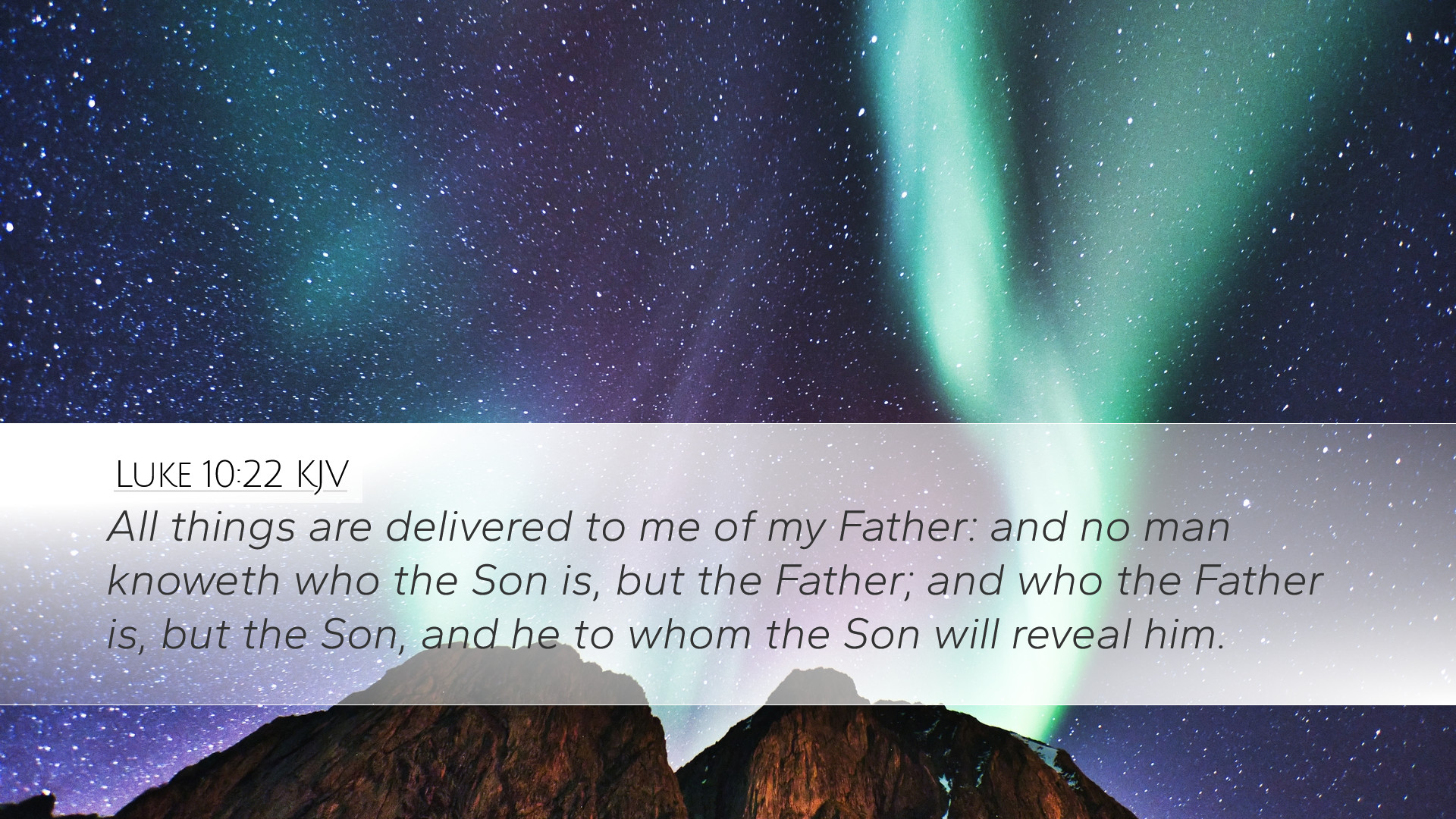Commentary on Luke 10:22
Luke 10:22 (KJV): "All things are delivered to me of my Father: and no man knoweth who the Son is, but the Father; and who the Father is, but the Son, and he to whom the Son will reveal him."
Introduction
The profound words of Jesus in Luke 10:22 encapsulate the unique relationship between the Father and the Son, and offer insight into the divine revelation and the mystery of the Godhead. This verse not only emphasizes Christ's authoritative commission but also highlights the exclusive knowledge of God, accessible solely through the Son. Various public domain commentaries provide rich insights into the theological implications of this text.
The Deliverance of All Things
According to Albert Barnes, the phrase "All things are delivered to me of my Father" speaks to the comprehensive authority granted to Christ. It signifies His role as Mediator and the One through whom God's purposes are unfolded. This authority is not merely administrative but has rich theological implications, as it denotes Jesus' supremacy and divine governance over all creation.
- Matthew Henry elaborates on this point, asserting that Christ's dominion encompasses both the natural and the spiritual realms. He is the rightful King who has received all authority from the Father, which includes the power to redeem, judge, and rule.
- Adam Clarke interjects that this authority to reveal divine truths signifies that no one, apart from the Son, can truly understand the nature of God, reflecting a highly relational aspect of divine knowledge.
The Knowledge of the Son and the Father
The latter part of the verse emphasizes a profound theological truth regarding knowledge and revelation. Henry comments on the exclusivity of knowing the Father through the Son, stating that "no man knoweth who the Son is, but the Father." This reflects the notion that divine knowledge is intimate and relational rather than merely intellectual.
Clarke highlights the essential truth that the Father reveals the Son's nature and mission to those He chooses. This aspect points to the sovereign will of God in revealing spiritual truths to humanity. It calls believers to humility, recognizing that understanding of God is granted by divine grace, not human achievement.
The Mutual Relationship Between Father and Son
In his commentary, Barnes emphasizes the unique filiation expressed in the phrase "who the Father is, but the Son." This highlights the close bond and perfect unity of essence between the Father and the Son, which is a cornerstone in Trinitarian theology. The relationship is not just one of authority, but also of love and cooperation in the work of redemption.
- Matthew Henry points out that this relationship illustrates the deep connections within the Trinity, whereby knowing the Son provides access to the Father. It also emphasizes the revelatory role of the Son as He makes known the Father’s character and will to humanity.
- Adam Clarke adds that the terms “Father” and “Son” foster a deeper understanding of God’s paternal nature toward believers. It signifies an invitation to engage in a relationship with God through Christ.
Revelation of the Father
In the concluding remark of the verse, "and he to whom the Son will reveal him," we find the crux of Christ's missional purpose. Henry interprets this as indicating that Jesus, in His earthly ministry, has a particular intention to reveal the Father to those who are receptive to Him. This offers a scriptural basis for the practice of evangelism, whereby believers are to share and reflect on the revelation of God through Christ.
- Barnes notes that the act of revelation is a reflexive grace of God, unveiling Himself to seekers through Christ, thereby deepening faith and understanding in the community of believers.
- Clarke reinforces this idea by asserting that the revelation is both personal and corporate; the knowledge of God brings believers into a transformative relationship that enriches their spiritual lives.
Theological Implications
Taking the insights from the commentaries into account, the theological implications of Luke 10:22 are profound. This verse articulates the core of Christian belief in the nature of God as relational and revelatory. It affirms the doctrine of the Trinity while simultaneously expressing the heart of the gospel—the way in which humanity can access God through Christ.
This understanding pushes pastors and theologians to reflect on their approach to sharing the gospel. The truth that God desires to be known and has made provisions for that knowledge through His Son can serve as a profound motivator for both evangelism and discipleship.
Conclusion
In summary, Luke 10:22 offers a compact yet profound statement on the nature of Christ’s relationship with the Father, the uniqueness of His revelation, and the profound implications for knowing God. It calls pastors, students, and scholars to a deeper exploration of the Trinitarian relationship and a renewed commitment to sharing the transformative knowledge of God through Christ.
As believers, engaging with this text can inspire a greater appreciation for the mysteries of the faith and a deeper longing to know God, as revealed in Christ, and to make Him known to others.


